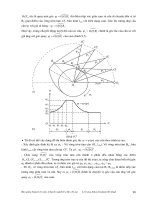WDM LAN Optical Backbone Networks phần 6 potx
Bạn đang xem bản rút gọn của tài liệu. Xem và tải ngay bản đầy đủ của tài liệu tại đây (894.2 KB, 12 trang )
51
Back-up slides
52
Optical Network Example –
Commercial / military platforms
Representative Subsystems
• Navigation
• Mission Processing
• Platform Monitoring
• Communications
• Sensors
• File Servers
• Displays
From: “Virtual Prototyping of WDM Avionics
Networks” Presentation by
Casey B. Reardon, Ian A. Troxel, and Alan D. George
HCS Research Laboratory, University of Florida;
September 2005,
IEEE AVFOP conference
Fiber Splicing for Avionics Fiber Networks
Agiltron
All Optronics
Data sheets for mechanical
fiber-optic splicers
53
54
Latency & Redundancy
Latency Summary
Connection latency includes circuit set-up in circuit-switched applications
(~10 ms) &
routing/processing latency for packet-switched applications (several µsec)
Transport latency: propagation delay, correlated to aircraft size is minimal on airplanes (1
µs or less). We assume 100 ns for tactical and 1 µs for widebody.
Need to account for additional latency associated with the insertion of an optical
network to support avionics systems. ( Define latency budget contributors)
Also analyze tradeoffs – e.g. compare optical connection setup time vs packet switching
queuing/processing
Redundancy Summary
Channel redundancy refers to the minimum number of separate paths available. For
example, dual redundancy would require two separate data layer links.
Tactical and widebody platform included a combination of non-redundant, dual redundant,
and quad redundant subsystems.
Many redundancy options can be supported within a common WDM infrastructure; can
specify redundancy requirement per “SLA” (COS / QOS) to satisfy a reliability or
availability objective of the avionics application
WDM-based networks enable a logical circuit view vs physical link view of redundancy
supported on the embedded optical infrastructure
Approved for Public Release; Distribution Unlimited
55
21
32
Representative Network Example
Functional Architecture
Optical Layer Source / Access node
(Also sinks for this application)
Avionics Rack (includes switches &
processors)
Sinks
n ~ 34 (32 source/sink nodes
2 switch nodes)
~ 2 Gb/s per source
Subnetwork Summary
Sources/Sinks to Switch Nodes (Avionics Rack)
Bidirectional Interconnection
1
4
5
8
9
12
13
17
16
20
…
…
…
. . . . . . .
…
…
66 links (for 32 sources & 2 switches)
Bidirectional Dataflow
Dual Redundant
Bursty, Packet Switched
Latency: µs scale
Approved for Public Release; Distribution Unlimited
56
Representative Network Example
Generic – Functional Architecture
Optical Layer Source / Video Access nodes
Avionics Rack
Sinks
Logical connections, Sources to Avionics Rack
Logical connections Avionics Rack to Sinks
1
2
…
n
3
n ~ 5 to 10 source nodes
~ 2 Gb/s per source
Subnetwork 1 Summary
Sources (e.g. video/sensors) to Processing Nodes
(switches and processors at Avionics Rack)
Avionics
Rack 1 (R)
Avionics
Rack 2 (L)
Subnetwork 2 Summary
Processors, switches to sinks (cockpit
and tactical displays, storage devices)
Approved for Public Release; Distribution Unlimited
57
Other ways to use the wavelengths
Analog Band
High speed
Digital Band
Control or Health
Monitor Channel (s)
1) Different data formats
Secret
channels
Classified
Channels
2) Multiple Independent Levels of Security
Unclassified
Channels
Wavelength
Wavelength
Choice of wavelength bands depends on understanding details of
•Component behavior
•Interactions in the fiber
58
Reconfigurability
Optical networks (single mode fiber, DWDM) can
be changed or new ones set up, as needed, if the
optical backbone nodes contain wavelength cross
connects.
Each overlay network can be operated
independent of the others (using wavelength
domain).
Applications can be added without rebuilding the
fiber infrastructure, if the right network
is built for
each application.
Reconfigurability can also provide
protection/redundancy/survivability.
59
WDM Networking – Access and
Network Interfaces
WDM Networking enables definition of standard interfaces across
multiple avionics system.
Network Access Interfaces – NAI
Backbone Network Interfaces - BNI.
SAE is standardizing BNI, NAI definition as well as
performance requirements across any of the WDM LAN
Optical Network Elements (ONEs); Telcordia is WDM LAN
standards subcommittee chair.
Cross-connects can be reconfigurable to allow updates,
protection
XC
XC
XC
XC
XC
XC
XC
XC
XC
60
Network Management and control
Level Definitions
Level
Functionality
1
Locally configured, and monitored
2
Locally configured and monitored via a local
craft interface to a local craft terminal
3
Centralized management via NMS/EMS,
unit connects to a NMDCN (Network
Management Data Communication
Network)
4
Centralized management via NMS/EMS plus
distributed control plane protocols for
discovery, routing and signaling to
automate service establishment and
recovery
61
Example ONE requirements: OTM
R-001: An OTM shall support at least one BNI -R or one BNI -S or one of
each, and one or more NAIs.
R-002: No channel entering an OTM on a BNI -R shall exit the OTM on a
BNI-S.
R: An OTM shall support at least one BNI_R or one BNI_S or one of each,
and one or more NAI
s.
62
Examples of Requirements & Objectives
(R/CR/O)
R: An OBN shall consist of an interconnected collection of
OBEs, containing at least one NAE, together with a set of
Interface Application Codes (IACs) defined at its NAIs.
R: The optical signals crossing the specified ONE and OFI
network interfaces, either BNI or NAI, shall conform to an
Interface Application Codes (IACs) per the application code
template defined in Table 5.4.
R: Each of the OBE (OFI and ONE) latencies shall be
specified. The overall OBN transport latency is the sum of
the OBE latencies.
R: The network shall be able to provide the required level of
redundancy. The level of redundancy shall be specified.
O: Where applicable, it is desirable to have a minimum 1:1
redundancy with an goal to provide 1:N redundancy where
practical.









